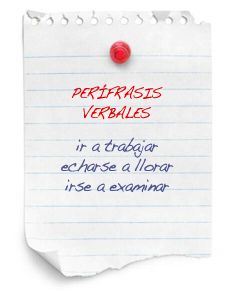#41: - Weekly perífrasis verbales: Practice Exercise: Parar + de + infinitivo
41: - Weekly perífrasis verbales / Practice Exercise: Parar + de + infinitivo
Parar + de + infinitivo -> to stop doing something (most often in the negative)
(I'm sharing a discussion I had with another SD member as it was very helpful to me on understanding the usage of this peífrasis verbales and several examples for you to study and learn from since this one is a little difficult to 'get' in English):
++++++++++++++++++++++++++++
My question after reading some examples I'd seen: Can it be used in a simple form like the following and sound right? Could I say, Paré de coser porque la máquina de coser se quebró. (I stopped sewing because the sewing machine broke.)
++++++++++++++++++++++++++++++++++++++
The answer to that: It is usually used for "negative" sentences. When you want to say "Paré de coser porque la máquina de coser se descompuso." it is a lot more common to use "Dejé" instead of "paré". Example: Dejé de fumar cuando tenía 40 años. (I stopped smoking when I was 40 years old.) You don't hear people say "Paré de fumar..." I haven't heard people use it that way, but I guess it depends on the country/place. It sounds OK, but it is a lot more common for "positive" and declarative sentences to use "dejar". Example: "Deja de quejarte." (Stop complaining.) If I say "Para de quejarte" it is OK, but not as common, again.

Parar + de + infinitivo
Examples/Ejemplos
No he podido parar de reírme después de que escuché ese chiste.
I haven't stopped laughing after I heard that joke.
He parado de sentirme triste después de que terminé con mi novio.
I have stopped feeling sad after I broke up with my boyfriend.
Mi hijo no para de llorar porque lo castigué.
My son has not stopped crying because I punished/grounded him.
No ha parado de llover todo el día.
It has not stopped raining all day.
++++++++++++++++++++++++++++++++++++++++++++++++++
A ‘perífrasis verbal’ is a structure with a helping verb plus an ‘infinitivo’ or a ‘gerundio’ (verb that ends in ar, er, ir).
More info on perifrasis verbales: a helpful link
Good link to explain perifrases verbales: great link by another SD contributor
Let’s practice a few of these in simple sentences. Here are the rules:
1.One sentence per post.
2.Use the ‘perífrasis verbal’ for this week in a sentence in Spanish. Then write it in English.
3.You may post one image to illustrate your sentence.
SilviaC will be the corrector for the Spanish. I will help out on the English. SilviaC ++++++++++++++++++++++++++++++++++++++++++++++++++++++
Una “perífrasis verbal” tiene una estructura con un verbo auxiliar y un “infinitivo” o “gerundio”.
Vamos a practicar un poco estas estructuras en oraciones simples. Estas son las reglas:
1.Una oración por respuesta
2.Usa la perífrasis verbal escogida para esta semana y escribe una oración con ella en español y en inglés.
3.Puedes usar una imagen para ilustrar tu respuesta.
SilviaC será la correctora de español. Yo ayudaré con el inglés.
New link I've found recently: new link with additional info *If you missed last week's practice here is the link: No. 40 - acabar + gerundio
5 Answers
Paré de leer cuando sonó el teléfono.
I stopped reading when the phone rang.
Nuestro equipo tuvo muchos problemas con la moto este año pero no paramos de pelear por el campeonato.
Our team had a lot of problems with the bike this year, but we didn´t stop fighting for the championship.

No ha parado de llover desde ayer.
It has not stopped raining since yesterday.
No he parado de cantar la canción después de que oírla en la iglesia.
I haven't stopped singing the song after hearing it in church.

 No he parado de esperar que la gente van a hacer decisiones racionales.
No he parado de esperar que la gente van a hacer decisiones racionales.
I haven't stopped hoping that people are going to make rational decisions.











